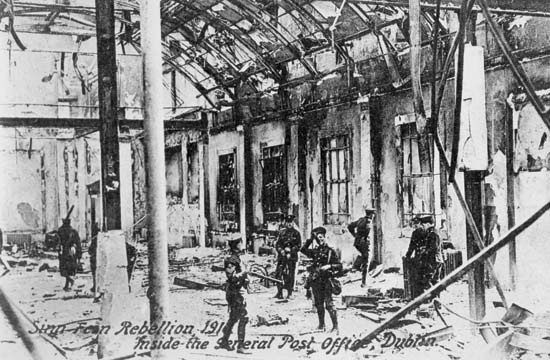Easter Rising
Irish history
also called Easter Rebellion
 (1916), republican insurrection in Ireland against British government there, which began on Easter Monday, April 24, 1916, in Dublin. The insurrection was planned by Patrick Pearse, Tom Clarke, and several other leaders of the Irish Republican Brotherhood, which was a revolutionary society within the nationalist organization called the Irish Volunteers; the latter had about 16,000 members and was armed with German weapons smuggled into the country in 1914. These two organizations were supplemented by the Irish Citizen Army, an association of Dublin workers formed after the failure of the general strike of 1913, and by the small Sinn Féin party.
(1916), republican insurrection in Ireland against British government there, which began on Easter Monday, April 24, 1916, in Dublin. The insurrection was planned by Patrick Pearse, Tom Clarke, and several other leaders of the Irish Republican Brotherhood, which was a revolutionary society within the nationalist organization called the Irish Volunteers; the latter had about 16,000 members and was armed with German weapons smuggled into the country in 1914. These two organizations were supplemented by the Irish Citizen Army, an association of Dublin workers formed after the failure of the general strike of 1913, and by the small Sinn Féin party.The uprising was planned to be nationwide in scope, but a series of mishaps led to its being confined, in the event, to Dublin alone. The British had learned of the planned uprising, and on April 21 they arrested the Irish nationalist Sir Roger Casement in County Kerry for arms running for the rebels. Eoin MacNeill, the leader of the Irish Volunteers, therefore canceled mobilization orders for the insurgents, but Pearse (Pearse, Patrick Henry) and Clarke went ahead with about 1,560 Irish Volunteers and a 200-man contingent of the Citizen Army. On April 24 their forces seized the Dublin General Post Office and other strategic points in Dublin's city centre, and Pearse read aloud a proclamation announcing the birth of the Irish republic. British troops soon arrived to put down the rebellion, and for nearly a week Dublin was paralyzed by street fighting. British artillery bombardments and fires compelled Pearse and his colleagues to surrender on April 29.
Pearse and 14 other leaders of the rebellion were court-martialed and executed by the British authorities in the weeks that followed. Though the uprising itself had been unpopular with most of the Irish, these executions excited a wave of revulsion against the British authorities and turned the dead republican leaders into martyred heroes. The Irish government collapsed, and, from then until the establishment (Dec. 6, 1921) of the Irish Free State, the British made several attempts to govern, none of which was very successful. The Easter Rising heralded the end of British power in Ireland. Eamon De Valera (de Valera, Eamon), because he was the senior survivor of the rising, dated much of his personal popularity with the Irish people from the time of that event.
- Clément Ader
- Clément Janequin
- Clément Juglar
- Clément Marot
- Clément Pansaers
- Clérambault, Louis-Nicholas
- Clüver, Philipp
- C.M.G.
- C.M.G. Lattes
- C.M. Kornbluth
- cnidarian
- cnidosporidian
- Cnidus
- C. Northcote Parkinson
- CN Tower
- coach
- Coachella Valley
- Coachman, Alice
- coachwhip
- coagulation
- Coahuila
- coal
- coal ball
- coal classification
- coal gas